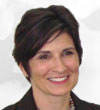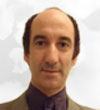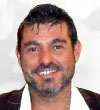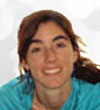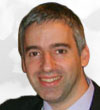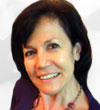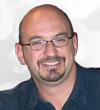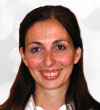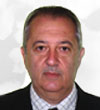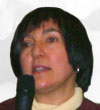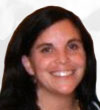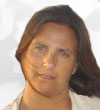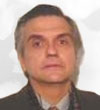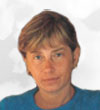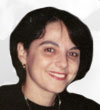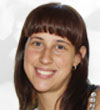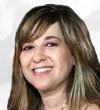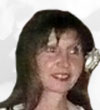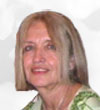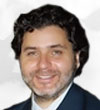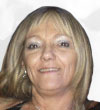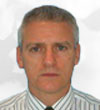|
|
Old Traditions and New Trends: How happy can that ELT marriage be?
English Language Teaching has undergone numerous innovations in the last few decades. Several language experts have fervently suggested discarding traditional practices which seem to have worked for years in favour of state-of-the-art approaches. When becoming acquainted with allegedly ground-breaking trends, some teachers embrace them as if they could magically enhance language learning, whereas others resist them as though innovative waves could sweep away their authority. This presentation will explore different ways in which we can use old traditions in language teaching with a twist in an attempt to show that informed eclecticism might prove more effective than extremist positions.
Magíster Mariano Quinterno
Mariano Quinterno is a Profesor de Inglés,Instituto Superior del Profesorado “Dr. Joaquín V. Gonzalez” and a Licenciado en Educación, Universidad Nacional de Quilmes. He also holds an M.A. in Applied Linguistics to the Teaching of English as a Foreign Language,Universidad de Jaén, Spain. He is a lecturer in Metodología de la Enseñanza and Estudios del Discurso at Licenciatura en Lengua Inglesa, Universidad Tecnológica Nacional. He teaches Seminario de Integración Didáctica para la Educación Superior and Lengua Inglesa III at Instituto Nacional Superior del Profesorado Técnico, Universidad Tecnológica Nacional. He lectures in Literatura Norteamericana and Lengua Inglesa I at Instituto Superior del Profesorado “Dr. Joaquin V. Gonzalez.” He has co-authored the book “Construyendo puentes hacia otras lenguas: reflexiones sobre la enseñanza de lenguas extranjeras en la escuela media” (La Crujía, 2009).
|
|
|
| |
| |
|
|
|
|
CLIL: Materials Development in the Argentinian Context
Content and Language Integrated Learning (CLIL) has become a buzz acronym in the ELT field. Despite being European in nature, its models could be incorporated in EFL contexts such as ours. In this presentation, I will provide an account of a CLIL experience in a secondary school in Chubut, Argentina. Through an action research journey I will explain the rationale and our context-responsive reasons underlying the integration of content and language learning in the EFL classroom. Most importantly, I will refer to how teachers developed their own materials to address contents which our students were interested in learning about through their regular English lessons.
Magister Darío Banegas
Darío Luis Banegas holds an MA in ELT from the University of Warwick where he is currently doing his PhD in Applied Linguistics. He teaches English at secondary schools in Esquel. He works for the Ministry of Education of Chubut as a curriculum designer and teacher trainer. He is also involved in teacher education development in Río Negro and Tierra del Fuego. He publishes in international journals and has been a speaker at national and international conferences. His main interests are: materials development, curriculum design, teacher development, and content and language integration in secondary education.
|
|
|
| |
|
| |
|
|
|
|
Talk 1: Error Correction: Breaking bad habits without breaking spirits
We want our students to be fluent, so we strive to create interesting meaning-focused activities for them to practice real-world language. However, how can we be sure that we are also focusing on language correctness and helping them become more accurate? This workshop will give an overview of basic terminology and the teacher’s decision-process that takes place when a student commits a mistake . . . or is it an error? Some ways to effectively draw students’ attention to their own mistakes will be discussed.
Talk 2: Incorporating Learning Strategies into the Language Classroom
What are learning strategies? Why are they important to teach? How do they help students become more efficient at learning language? This workshop will take participants through an overview of Rebecca Oxford’s Strategies Inventory of Language Learning (SILL) which shows strategies used by successful language learners. Participants will work in groups to determine which strategies they would like to start introducing in the classroom and how they would overtly teach and practice these strategies.
Jenifer Herrin, M.A.
Jennifer Herrin holds an M.A., Education-TESOL from the University of New Mexico and a B.B.A., Marketing from the University of Texas. Ms. Herrin has taught English to speakers of other languages and conducted teacher development in Eastern Europe, Latin America, Asia, Australia, and the US. She served as an English Teaching Fellow in Panama (1996-97), as a Fulbright Lecturer (TEFL) in Nicaragua (2001-02), and as the Senior English Language Fellow in Ukraine (2006-07). She has also conducted special projects in the Republic of Georgia and Argentina through the English Language Specialist program, and in Ukraine through the Fulbright Specialist Program. She was an ESL instructor at Central New Mexico Community College for 7 years. Currently, she is the Senior English Language Fellow in Argentina, a program sponsored by the U.S. Department of State. She is especially interested in exploring task-based techniques and interactive methodologies for learning language.
|
|
|
| |
|
|
|
| |
|
|
|
|
More to music than meets the eye: using songs to teach lexis and engage students in thought-provoking debates
More often than not, teachers use songs to introduce or revise specific grammatical structures. Lexis and content, however, are two usually-disregarded selection criteria. The aim of this presentation is to share ideas on how we can help our students both expand their lexical range and develop their critical awareness through lyrics analysis.
Profesor Alberto Longobardi
Alberto Longobardi graduated as Profesor en Inglés from Instituto Superior del Profesorado “Dr. Joaquín V. Gonzalez,” where he currently teaches Lengua Inglesa II. He is also a lecturer in Lengua Inglesa III and Enseñanza de Inglés I y II at Escuela Normal Superior “Sofía Broquen de Spangenberg.” He has designed and taught Professional Development courses at CePA (Escuela de Capacitación Docente - Centro de Pedagogías de Anticipación). He has been Head of the English Department for both Kindergarten and Primary School at New Model International School since 2001.
|
|
|
| |
|
| |
|
|
|
|
Idioms and phrases that we used to use and the ones that we use today
Is it still raining cats and dogs or have I just bitten off more than I can chew? It may seem like only yesterday since we last used such expressions, but are they fading into disuse? In this presentation Cameron Riddle will explore contemporary use of English idioms and compare idioms now with idioms in the past. If at one time you were the sharpest tool in the box, could you now be the brightest light on the tree? If, by contrast, you used to be tuppence to the shilling, would you now be twenty pence to the pound, or just a couple of cans short of a six pack? Idioms in current use may in some cases have origins that are as ancient as they are sinister. What, for example, might have really cost an arm and a leg? Did we ever literally bite the bullet? Looking to the future we might ask ourselves if we’ll ever stop putting all our eggs in one basket and start putting all our files on one iphone. Where do idioms come from, and what causes them to disappear and evolve? These are difficult questions that will always be fascinating and important.
Magíster Cameron Riddle
Cameron Riddle graduated from the University of Edinburgh in 2006 with a Master of Arts in French and Spanish Language and Literature. Soon after graduating he took up an English teaching post at Hangzhou Foreign Languages School in Hangzhou, China, where he worked for one academic year. In 2008 he acquired a Cambridge English language teaching certificate from the Randolph School of English, Edinburgh, and the following year he taught business English in Buenos Aires with the institute Pensaris Corporate Training. Since then he has taught English history and English language at the Universidad Nacional de Lanús, Buenos Aires.
|
| |
|
| |
|
| |
|
|
|
|
Hey! How come they are learning pronunciation in the classroom next door?
“It is not possible to teach pronunciation at school” Have you ever heard (or said) a phrase like this? If you have, then you are invited to join this presentation where we will attempt to destroy this myth and many, many others related to the teaching of pronunciation. We will also share a number of activities ranging from the simplest to more elaborate ones, including resources in the Web. And if we get lucky you might even end up believing that teaching and learning pronunciation can actually be fun!!
Prof. Esp. Mónica Terluk
Monica Terluk has got a degree as Profesora de Inglés from Instituto Superior del Profesorado “Dr. Joaquín V. González” and has been an EFL teacher for more than 25 years. She has specialized in the teaching of Phonetics and Phonology and the Didactics of Phonology and has delivered several lectures and workshops on the subject. She is also specializing in education and technology at UBA. She is currently writing her dissertation on the subject of Phonology and Teaching for her Licenciatura en Lengua Inglesa at Universidad Tecnológica Nacional. For the last 20 years she has been training teachers in the areas of Phonetics and Laboratory Practice at Instituto Superior del Profesorado “Dr. Joaquín V. González”, where she is also the Head of the area of phonology and Head of the Language Laboratory. She has also taught phonetics and phonology at UTN, St Catherine’s and Sagrado Corazón Teacher Training Colleges, among others.
|
| |
|
| |
|
| |
|
|
|
|
|
Meeting New Classroom Needs? Let’s face the Challenge Together
In a fast-changing world, meeting our students’ growing needs has become a new challenge for all of us teachers. A challenge we can’t afford to face alone. It’s collaborative work between students and teachers all along. Let’s face this 21st century challenge together. Let’s see how we can adopt what our students like and adapt it to meet our teaching needs. Let’s make their learning experience worth the ride!
Profesor Gustavo González
Gustavo González graduated as a teacher of English at I.S.F.D. N° 5 in Pergamino and holds a postgraduate degree from UBA. He’s currently attending a postgraduate diploma course on Education and New Technologies at Facultad Latinoamerica de Ciencias Sociales (FLACSO).
He has been in the ELT field since 1993, working as a teacher, school coordinator, teacher trainer and presenter. He has been delivering seminars and workshops all over Argentina, neighboring countries and Asia.
He is one of the contributors to the book “Imagination, Cognition & Language Acquisition: A Unified Approach to Theory and Practice”, published by the New Jersey City University and has also written some articles for IATEFL and other institutions. He is a teacher trainer for the Oxford Teachers’ Academy. He is a former vice president of APIBA, the Buenos Aires English Teachers’ Association and former vice president of FAAPI, the Argentine Federation of English Teachers’ Associations.
|
| |
|
| |
|
| |
|
|
|
|
Are your students terrified every time you turn on the CD player?
Developing Listening Comprehension without pain.
We’re all too familiar with the looks of anxiety, eyes shut tight in concentration as your finger approaches the “play” button on the stereo, as well as the cries of “I don’t understand anything!”
Don’t worry! It really doesn’t have to be this way! Come and find out how to banish the terror of listening comprehension from your classroom and motivate your students to become efficient and enthusiastic listeners.
Alastair Grant B.A.
Alastair Grant is an English teacher and the Teacher Development Manager at International House in San Isidro. He holds an Honours Degree in English Literature and Philosophy from the University of Warwick in the UK, has completed the International House Certificate of Advanced Methodology and is currently completing the Cambridge DELTA.
As Teacher Development Manager in San Isidro, Alastair organises and delivers sessions in teacher training both in-house and at schools and institutions, including the I.H. Director of Studies Conference in London. His special interests are Process Writing and Discourse Analysis.
|
|
|
| |
|
|
|
|
|
|
Communication Boosters: Games and Drama Tools in the classroom
Games and Drama Tools in our learning environments are invariably interactions designed to challenge our students to heighten their senses and skills, as a prelude to move beyond habitual thinking and interacting. They also become actively engaged with other participants, developing relationships, trust and a positive attitude towards learning. Drama exercises are formulated so as to infuse a given structure with genuine content.
As a result, our students will be encourage to achieve critical consciousness since every minute of their learning processes through drama, they are faced with complex decisions concerning justice, democracy and ethical claims. Techniques such as role play, circle time, use of I statements help students to be more assertive and confident in their use of emotional intelligence skills.
Magíster Carolina Echeverría
Carolina Echeverría holds a M.A. degree in Applied Theatre, Drama in the Community and Drama Education from Central School of Speech and Drama (CSSD), London (2004). She has organized and facilitated workshops within NGOs in UK, Brazil, Cambodia, Vietnam and Buenos Aires for various vulnerable groups. Since her return to Buenos Aires, Carolina has been coordinating and teaching Drama within the Primary and Middle Years IB programme at St Catherine´s-Moorlands School since 2007, directs the after school drama clubs and she has created her own Theatre for Development Company running workshops in prisons, special needs schools and communities centers.
She has also been a guest lecturer at Central for the postgraduate students in Applied Theatre about the use of Theatre of the Oppressed and Theatre for Development and in Education. Carolina has been teaching Drama in institutions of higher education since 1996 in Buenos Aires and has taught for three years at the Gateway Academy in London, where she created a Drama Behavioral Project for challenging and disturbed young people.
|
|
|
| |
|
|
|
|
|
|
|
All you need to know to make the Interactive Whiteboard your “slave”
In the same way that the old-style blackboards were a technology that could be used in traditional schools every day by all teachers, interactive whiteboards are already displaying their facility to be used in this ‘every-day-by-every-teacher’ way in our emerging digital schools. The Interactive Whiteboard (IWB) is a technology that promises to truly transform the classroom. The key to a successful IWB implementation is in the training, something which seems to be missing when many organizations unpack and install these shiny new toys. During this presentation, Prof. Bilopolsky will demonstrate how to set up an interactive whiteboard and will provide hands-on practice, highlighting its key functions for language teachers. Session participants will be encouraged to experiment with the features and functions presented.
Prof. Alfredo Bilopolsky
Profesor de Inglés e Inglés Técnico from Instituto Nacional Superior del Profesorado Técnico de la Universidad Tecnológica Nacional. English Coordinator at Scholem Aleijem School and Hillel School. He has delivered workshops on Teaching Very Young Learners and on the use of computers for language learning in different conferences in Argentina. He is co-author of the Video "Descubriendo en Inglés", Primeros Pasos Producciones. He is an Assistant Lecturer in Residencia Pedagógica at Universidad Tecnológica Nacional.
|
|
|
|
|
|
|
|
|
Meeting the needs of the new primary classroom with a new toolbox…and a renewed spirit
Teaching has become a challenging profession that requires not only a strong vocation, and dedication a fair knowledge of administrative procedures and regulations; classroom and conflict management strategies; and very good interpersonal communication skills to be able to relate to school authorities, colleagues, students and parents accordingly. These are trying times.
Our students are digital citizens who have a short attention span and demand permanent attention and appealing activities. In fact, meeting the needs of the new primary classroom can be, at times, too time and effort consuming. In this workshop, we will share some very useful activities that require little or no preparation, making use of varied resources and technology; some tips on classroom and conflict management and on how to foster a home-school relationship.
Licenciada Marta Graciela García Lorea
Postgrado en Educación a Distancia UNED (Spain), Licenciada en la enseñanza de Inglés, Universidad CAECE. Profesora de Inglés cum laudae, Instituto Nacional Superior del Profesorado “Dr. JoaquínV. González”, Maestra Normal, Escuela Normal en Lenguas Vivas "Sofía B. de Spangenberg". Currently ELT consultant; Relax&Learn director; ESP immersion courses and professional development seminars. Director of Medical English Courses, Instituto Postuniversitario Hospital Italiano. Presenter at national and international congresses.
One Day in the Life, iEARN project co-facilitator. Former Foreign Language Supervisor, Head of Schools of Languages, Primary and high school teacher, Ministerio de Educación de la CABA.
Co-author, Sunshine, Kindergarten series, Garnet. Teacher’s Guides for Blossom, Mc Graw Hill kindergarten series.
|
|
|
|
|
| |
|
|
|
|
Teaching Culture through classroom games
Does the Queen of England drink maté? A cultural question? A fun question? Both! Let’s find an answer! Culture -whether it be high brow, with a capital ‘C’ or simply ‘popular culture’- is definitely inseparable from people, their language and so from language learning and teaching. It can, however, make your let’s-just-have-fun generation students switch off. This presentation will help you marry language and culture with fun classroom games to stimulate your students’ (and even your!) curiosity for the English-speaking world. It will hopefully give you some background and ideas you can implement in your English classroom, but you will have to play yourself!! R U game, Your Majesty?
Magíster Sebastián Bianchi
Sebastián Bianchi is Teaching By-Fellow at Churchill College, University of Cambridge, England, United Kingdom. An émigré Profesor de Lengua Inglesa,Instituto Superior Josefina Contte, Corrientes, Argentina, he re-located to the UK in 1995 and graduated with Honours as Master of Arts in Literary Studies,De Montfort University, Leicester, England, specialising in Scots Literature.
He conducts research and teaches Spanish at graduate and post-graduate level for Cambridge.
An avid writer, among his recent publications are the multimedia language programme Spanish At Your Fingertips (BBC Active) and two series of books for A Level, including the book of classroom games Friday Afternoon Spanish (2010).
|
|
| |
|
|
|
|
|
| |
|
|
|
|
Can classroom teachers create and implement their own materials? You bet!
All teachers engage in the process of material design in order to bring novel and customized tasks into their classrooms. What different kinds of materials are there? How can I make sure that raw input can successfully turn into task? This workshop seeks to address these issues by showing how to go about the process of creating materials for our students. The process, however, does not end in the task but extends into didactic sequence to show how the task that we have created may be fully integrated in our lessons.
Magíster Myrian Casamassima
Myrian Casamassima, Profesora en Inglés, Instituto de Enseñanza Superior en Lenguas Vivas “Dr. Juan Ramón Fernández”, Magíster en Psicología Cognitiva y Aprendizaje Facultad Latinoamericana de Ciencias Sociales (FLACSO) y Universidad Autónoma de Madrid, Licentiate Diploma in TESOL,Trinity College, London. She has been a Methodology Lecturer and a teacher trainer at Instituto de Enseñanza Superior en Lenguas Vivas “Dr. Juan Ramón Fernández”. She is the Coordinator of the Teachers´ Centre at Asociación Ex alumnos del Profesorado en Lenguas Vivas “Dr. Juan Ramón Fernández”., where she is currently developing Teacher Development Projects as well as writing ELT materials.
|
| |
|
| |
|
|
|
|
A logical way to understand phrasal verbs and teach them
Phrasal Verbs do have a logical way to be understood and taught and most important: to be used spontaneously by all speakers. The English saying runs “ the sting is in the tail”. We need to understand the tail (particle) to interpret the whole meaning. Learners of English in general become stuck on studying them as they concentrate on the verbs and not on the particles.
Doctor Recca invites you to personally SHARE some hints on this topic in this lecture.
Doctor Antonio Recca
Antonio J. Recca graduated as Profesor en Inglés y Traductor Científico at Instituto Superior del Profesorado "New Castle". He holds an M.A. in English Language from the University of Pennsylvania. He is a Doctor in English Literature from Ashwood University,USA. He is a Lecturer in at Traductorado Público in Universidad Nacional de Lanús. He was also a Lecturer in English Literature at Saint Mary´s School in the UK.
He holds a Maestría en Administración de Empresas con especialización en Relaciones Laborales from Universidad Nacional de Lomas de Zamora where he is a lecturer in Strategic Planning and Finance.
|
| |
|
| |
|
| |
|
|
|
|
Teaching vocabulary at an advanced level: the case for the use of technology.
Teaching vocabulary at an advanced level has always posed a challenge to teachers as advanced students already have a considerable store of vocabulary at their disposal and feel they can communicate fairly well. In this talk we will look at ways in which teachers can help to enrich and expand their students’ vocabulary knowledge through the integration of new technology (interactive whiteboards and web 2.0 tools) with traditional classroom teaching. Several activities will be presented which will cater to different learning styles and which will provide students with an opportunity to identify, organise and record not only individual words but also larger chunks of language.
Licenciada Viviana Myslicki
Viviana Myslicki graduated as a Profesora de Inglés from Instituto Superior del Profesorado “Dr. Joaquín V. González”, and as a Licenciada en Educación from Universidad Nacional de Quilmes. She has specialised in English Language and Phonology, has lectured in Language II at Instituto Nacional Superior del Profesorado Técnico de la Universidad Tecnológica Nacional for more than 29 years and is currently the Jefa de Área de Lengua Inglesa in the same institution.
She has also lectured in Phonetics at Instituto Superior de Formación Docente No. 24, Bernal, Universidad de Belgrano, and currently at INSPT-UTN.
She is co-Liaison Officer of APIBA (Buenos Aires Association of English Teachers) Special Interest Groups and an active member of the Language & Phonology and e-Teaching and Learning SIGs. She is also Co-Director of Studies of T.E.L. Center.
|
| |
|
| |
|
|
|
|
Let´s celebrate the tragedy of being a teacher of English!
An entertainment
When and why did you decide to become an English language teacher?
Was it easy to make it to graduation?
Was it really easy afterwards?
Magíster Juan Ferretti will regale us with his tongue-in-cheek comments about the twists and turns, the adventures and misfortunes of the ELT profession in Argentina.
Magíster Juan A. Ferretti
Juan A. Ferretti holds an M.A. in TESOL and Applied Linguistics,University of Leicester, UK. He teaches Academic Writing, Postcolonial Literature and Critical Discourse Analysis at Licenciatura en Lengua Inglesa, Universidad Tecnológica Nacional. He is a lecturer in Twentieth-Century Culture and Twentieth-Century Literature at Insituto Nacional Superior del Profesorado Técnico de laUniversidad Tecnológica Nacional , Language IV and Academic Writing at Instituto Superior del Profesorado "Dr. Joaquín V. González”, Language III and Language IV at Instituto Superior del Profesorado del CONSUDEC. His main interests are Academic Writing, the Language-Culture Interface and Critical Discourse Analysis.
|
|
| |
|
|
|
|
|
|
Working in difficult classroom contexts.
This presentation will bring scenes from the classroom for us to analyze together. They depict difficult situations that are part of our daily school life at many state schools: apathy, noise, direct challenges to our authority, etc.
We will be looking at tones of voice, gestures and physical actions that take place in those classrooms, both on the part of students and on the part of teachers. We will do so in order to detect little “openings”, i.e. moments when we can intervene in order to overcome these difficult situations. We will also consider possible ways to do so successfully by observing how our actions make an impact on what is going on. By reflecting and considering the context of situation, we will revise our teaching styles and come up with alternatives to achieve our ultimate aim: student learning.
Licenciada Mónica Gandolfo
Profesora en Inglés, Instituto Superior de Formación Docente “Bernardo Houssay”. Licenciada en Educación and Especialista en Nuevas Infancias y Juventudes, Universidad Nacional de Quilmes.
She teaches Inglés y su Enseñanza III and Espacio de la Práctica II and IV at Instituto Superior de Formación Docente “Próspero Allemandri”. Profesora titular of Trayecto de Construcción de la Práctica Docente Tramo II and Profesora interina of Trayecto de Construcción de la Práctica Docente Tramo I at Escuela Normal Superior en Lenguas Vivas "Sofía Broquen de Spangenberg" and of El profesor de inglés y el maestro de grado at Instituto Superior del Profesorado “ Dr. Joaquín V. González”.
|
| |
|
| |
|
|
|
Developing and strengthening interpersonal bonds in the new classrooms through language tasks
Have you ever felt that your groups were missing something? Have you sometimes wondered how to connect to your students? How to make of your class a real group?
This talk will explore ways in which we can create bonds with our learners and engage them emotionally with each other, with us and with our lesson. Come and share plenty of simple, varied and fun activities that will make your learners just love your lessons.
Traductora Silvana Giménez Amadeo
Silvana Giménez Amadeo holds a translation degree, Traductor Literario y Técnico Científico en Inglés from Instituto de Enseñanza Superior en Lenguas Vivas “Dr. Juan Ramón Fernández”. She has also attained the Certificate in Advanced Methodology, issued by International House Teacher Training Institute and the DELTA 1 Cambridge Teaching Award.
Silvana currently teaches CAE level at Colegio Mallinckrodt Martínez and Language and Applied Thinking at Florida Day School, where she is an Educational Tutor for Middle School.
She is also an International Cambridge Examiner for IELTS at International House San Isidro.
Silvana has delivered teacher development sessions in schools in Buenos Aires and Córdoba and has participated in prestigious EFL events.
|
|
| |
|
|
|
| |
|
Looking at the media with critical eyes: teaching intermediate and advanced students to “read” movies, tv and print between the lines
The so-called “digital” era with its ongoing, swift innovations has been challenging the traditional role of teachers over the years. It has also significantly transformed our students’ profiles and learning habits. Moreover, the Internet has often proved to be a more effective and motivating instructor, as far as language learning is concerned, than real classroom teachers. In the face of such overwhelming technological blitz, how are we teachers to rise up to the challenge? A possible way out of the quandary lies in being “critical” and encouraging our students to be critical in turn.
Licenciado Gastón Basile
Gastón Javier Basile is Licenciado en Letras by the University of Buenos Aires. He is currently preparing his Ph.D dissertation in Classical Studies and Discourse Analysis. He has conducted research in the area of Classics, Linguistics and Renaissance Studies and participated in national and international symposia.
He currently works as Professor of Classical Greek, Facultad de Filosofía y Letras, Universidad de Buenos Aires, and teaches Spanish Grammar and Discourse Analysis, Instituto Nacional Superior del Profesorado Técnico de la Universidad Tecnológica Nacional, Logic and Theory of Knowledge,Universidad Argentina de la Empresa, and Critical Discourse Analysis and Cultural Studies, Licenciatura en Lengua Inglesa, INSPT-UTN.
He has also been a teacher of English Literature and History in bilingual secondary schools for over twelve years and has wide experience in training candidates for ESOL exams, as well as IGCSE and IB diplomas.
|
|
|
|
| |
|
| |
|
|
| |
|
How online teaching and face-to-face teaching can get to be the best of friends
A common myth about e-learning is that it is completely new and different from face-to-face learning. However, with the spread of information and communication technologies, online teaching is making its way into face-to-face teaching. E-learning is not fundamentally different from regular learning, it is a part of it and so the same principles that apply to other forms of teaching also apply to e-learning. Adopting e-learning is like adding a new set of tools to our existing instructional box. The effectiveness of student learning outcomes depends not only on our choice of tool but on what we build with it, how we design and integrate new technologies into our classrooms.
Magíster Verónica de la Encina
Verónica de la Encina is a Profesor en Inglés, Instituto Superior Olga Cossettini, Rosario. She holds a Master of Arts degree in Teaching English as a Foreign Language (TESOL), University of Jaén, Spain (2008). She also holds a Postítulo en Gestión Directiva, and Licenciatura en Educación con especialización en problemáticas de la enseñanza de la lengua extranjera, Universidad de Quilmes, Bs As.
Ms de la Encina has taught all levels of English. She has been head of English department and head of secondary school. She holds a tenured chair in areas such as English Grammar, Language Arts, Research and Psycholinguistics in high education teacher and translator development programs, Instituto Superior San Bartolomé, Rosario, since 1992. She created and now coordinates a bilingüal secretarial course delivered in e-learning modality at the same institute. She is an on-line tutor and trainer, instructional material designer and teacher and translator developer. She has lectured on topics related to English language teaching, e-learning and e-teaching. She is co-director of e-duTraining.
|
|
|
|
| |
|
| |
|
|
| |
|
Practical Ideas on how to go about teaching English in adverse classroom situations
Our present-day learners have acquired, in the best of cases, little background knowledge in every aspect of their education to meet the needs of the new century. Thus, Interpretation (Listening and Reading) plays a major role in the teaching of English as a foreign language in adverse situations not only for the learner but for the facilitator as well. Interpretation, then, is bound to offer a myriad of possibilities so that learners can have access to a world practically unknown to them.
Profesor Esteban Cresta
Profesor de Inglés, Instituto Superior del Profesorado “Dr. J.V. González”.
Diploma of Studies. Christ Church University. Canterbury. U.K.
Candidate to Maestría en Educación a Distancia, Universidad Tecnológica Metropolitana,Chile.
Profesor y Jefe de Area Profesorado de Inglés en ISFD 18. Banfield. Provincia de Buenos Aires. Profesor en los Institutos Superiores de Formación Docente Nros 35, Monte Grande, Nro 41, Adrogué y Nro 11, Lanús
Ex Profesor de la Universidad Argentina de la Empresa, Instituto Nacional Superior del Profesorado Técnico de la Universidad Tecnológica Nacional, Facultad Regional Buenos Aires de la Universidad Tecnologica Naciona. Abril 1985 hasta 1991, Universidad Nacional de Lanús, Escuela del Cuerpo Profesional del Ejercito e Instituto Superior del Profesorado. Dr.J.V. González." Lengua Inglesa I.Ha presentado y publicado artículos y libros de texto para la enseñanza del idioma inglés.
|
|
|
|
|
| |
|
|
| |
|
Teddy bears and real bears always in mind: planning a unit for the 21st century Kindergarten
"... Childhood's learning is made up of moments. It isn't steady. It's a pulse." E. Welty
During this worshop we will follow the steps needed to design a Literary based Unit for Kinder which eventually, could be used in different grade levels.
Aims, Activities, Resources and Assessment will be some of the ingredients we will be working with.
Come ready to share ideas and discover what we want children to know, understand and do.
Magíster Judy Bruetman
Judy Bruetman holds an M. A. in Education from Boston University and a degree as English-Spanish translator from Instituto de Enseñanza Superior en Lenguas Vivas "Juan R. Fernandez". She has taught English in Haifa, Jerusalem, Boston and Buenos Aires. She has also done post-graduate work in the fields of History of Art and English Linguistics at the Hebrew University of Jerusalem, Israel.
As a SEAL member, Judy has a strong commitment to Brain-based teaching and Self-esteem, attending International Conferences in Great Britain since 1995. In her presentations, she tries to blend a holistic approach to teaching with brain friendly practices, together with the impact of emotions on the Learning Process.Judy has presented workshops in Panama (International Reading Association, 2004), Chile (AASSSA), Las Vegas (2006) and different provinces in Argentina.
Judy is also a member of IRA (International Reading Association) and NCTE (National Council of Teachers of English, USA).
(see biodata above)
|
|
|
|
|
| |
|
| |
|
|
| |
|
And they´ll go “Wow!”.
Developing Multimedia Projects across the ELT Classroom Walls.
The constant change present throughout a single, cross-curricular, school, “twin” or global multimedia project (MP) might make us give an MP a second thought. However, if we have a well-thought out plan and well-defined roles, and search for collaboration and cooperation beyond the classroom walls, we will be able to turn it into an enjoyable, rewarding experience, full of surprises… for learners and teachers as well.
In this presentation, we will first go over seven good reasons for implementing MPs in the ELT classroom and their underlying cognitive learning theories. We will then take a glance at a model for the production of MPs and a closer look at what each step in the process entails. We will also share guidelines, rubrics, resources and golden tips that will liven up and enrich the hands-on experience.
Magíster Claudia Ursi
Claudia Ursi holds a Master in Educational Technology & ELT from the University of Manchester, UK. She has been using technology in ELT at T.A.L.E.S. since 1994 and has been training teachers since then. She has developed websites and online activities and participated in the design of e-learning projects. She is especially interested in the use of technology in social constructivist environments and the implementation of changes in educational settings.
|
|
|
|
|
| |
|
| |
|
|
| |
|
Training your students in Advanced Listening and Speaking Skills: an interpreter’s perspective
This presentation aims at showing some of features of listening comprehension and expression within the framework of conference interpretation with a view to sharing a perspective that may help to enrich ESL practices.
Listening comprehension for interpretation purposes differs considerably from ordinary listening activities. Interpreters must be able to recognize not only the speaker’s ideas and concepts but also the logical connections between them and the speaker’s intent. Interpreters see through the form in order to grasp the substance of the message making a unique analytical effort. Comprehension does not work at term level but at discourse level. Therefore, the interpreters’ capacity to build their discourse on their understanding of the network of complex conceptual interrelations that make up the fabric of the source message is paramount and demands specific training.
The effort required for expression in normal circumstances is exacerbated by the constraints of the interpreting situation. Interpreters are not expressing their own ideas; they are striving to re-express messages which are sometimes unfamiliar to them; they are pressed by time and the uncertainty of a message that unfolds there and then. In spite of all this, interpreters are to maintain and enhance quality of expression, which calls for rigorous training on oral skills. Greater flexibility and good range of expression are a must in this field.
Profesora y Traductora Olga Álvarez
Olga Álvarez is a conference interpreter, member of the International Association of Conference Interpreters, AIIC; Asociación de Intérpretes de Conferencias de la Argentina –ADICA; Associação de Intérpretes de Conferência –APIC, and Colegio de Traductores Públicos de la Ciudad de Buenos Aires.
She graduated as Traductora técnico-científica y literaria en idioma inglés and Profesora de inglés from Instituto de Enseñanza Superior en Lenguas Vivas“ Dr.Juan Ramón Fernández”; and Traductora Pública de Portugués from Universidad Argentina de la Empresa.
She participated in the Fulbright Teacher Exchange Program, and did research on training at Universidade Clássica de Lisboa.
She is the head of EXCELTI.
|
|
|
|
|
| |
|
|
|
|
Tasks and Tips to exploit the full potential of Web 2.0 to enhance learning
These days connectivity means a lot to our students. They have become more familiar with the net than we, teachers, can imagine. They have Blogs, Facebook and Twitter accounts. These applications and some tools, among others, are part of the so-called Web 2.0 and teachers can take advantage of them to promote language learning. It is the purpose of this workshop to raiseawareness of the ways teachers may enhance their lessons using different tools in the Web 2.0. For this, some comments will be made about the Web 2.0 and then some activities and tips will be shared among speakers and teachers. Finally, speakers will suggest using Blogs as a repository of the Web 2.0 resources.
Profesora Especialista Romina Hirniak
Romina Hirniak is a Profesora en Disciplinas Industriales,especialidad Ingl és e Inglés Técnico from Instituto Nacional Superior del Profesorado Técnico de la Universidad Tecnológica Nacional. She is currently working on her thesis in her Licenciatura en Lengua Inglesa at Universidad Tecnológica Nacional. She has been Supervisora de Practicas Profesionales Docentes in Didactics for Primary Schools at Instituto Superior del Profesorado Técnico- Universidad Tecnológica Nacional. She has
also taught English in Primary school, kindergarten and at secondary level. She has
worked as coordinator at Learning Centre Institute and a Language teacher training students for international exams. She is currently working at CEP and Escuela del Cono Sur in Tierra del Fuego as a teacher of English and as a TKT trainer. She is also working as a distance learning tutor in Tierra del Fuego.
Profesora Noelia E. Tarquini
Noelia Tarquini is a Profesora Nacional en Disciplinas Industriales, especialidad Inglés e Inglés Técnico from Instituto Nacional Superior del Profesorado Técnico de la Universidad Tecnológica Nacional. She is currently working on her dissertation thesis on Teacher Training for the Licenciatura en Gestión Educativa - CAECE. She delivered a lecture on Critical Thinking Activities in Share convention 2007 and 2009. She is a teacher of English in Educación Primaria at Colegio Cardenal Copello, Victoria. She teaches Literature at secondary level IGCSE at Colegio Carmen A. de Marin. She is a member of the team currently working on “Proyecto Netbooks” at the same Institution.
|
|
| |
|
|
| |
|
Stories as Powerful Springboards in the Kindergarten Classroom
Stories can be exploited to become powerful and motivating resources when teaching English to very young learners. In this workshop, a 5 minute story will be transformed into a whole three-week project for the kindergarten classroom. A concrete example will be used to show how a story can be a starting point for a memorable process leading towards an end product. Imagination, drama techniques, songs, language games and storytelling skills will be explored together with practical ideas to use in the classroom.
Profesora Sarah Hillyard
Sarah Hillyard graduated as Profesora de Inglés from Asociación Argentina de Cultura Inglesa (AACI). She has been teaching English at Kindergarten level for six years and has been Kindergarten English Coordinator for two years at Colegio San Martín de Tours (mujeres). She also teaches English at Secondary level at Colegio Aula XXI. She spent two years travelling as an actress with “The Performers” (TIE). At present she is studying for a Masters Degree in Teaching English to Young Learners (by distance) from the University of York, U.K.
|
|
|
|
|
| |
|
| |
|
|
| |
|
Let’s act out favourite scenes from all time favourite movies!
Movies provide great raw material for work on listening, diction, fluency, retelling, reported speech, role play and creativity. In this workshop we will show scenes from a silent movie and from a modern classic. In order to work with greater precision, we will choose two small teams to work on each scene. Following a brief orientation by the presenter, the teams will be designated and the scenes will be projected. The team choosing to work on the silent movie will be asked to provide the dialogue, retell it and/or act it out. The dialogue may vary according to how the situation is understood and this will provide room for discussion of the most appropriate language for each situation. The other team will use retelling technique to describe the action sequences in the scene from the modern movie. Subsequently they will proceed to describe the characters, the conflict and discuss why they agree or disagree with the ideas expressed or the actions taken. Finally, they will use role play to recreate the scene. Time permitting; there will be a short feedback on how to apply this technique in the classroom.
Alfred Seymour Hopkins B.A.
Alfred Seymour Hopkins, born in Los Angeles, California, got his B.A. in Journalism and Social Science from the University of California at Berkeley. He studied theater in Buenos Aires with Maria Elena Rivera, Toni Barquet and Ricardo Bartis, taught diction and theater at the Instituto Nacional de Lenguas Vivas, founded the Hopkins Creative Language Lab, dedicated to applying theatrical technique to the teaching of English, and has presented numerous workshops on drama and storytelling at schools, cultural institutions and English Congresses. He edits a web magazine in English and Spanish: http://jaquematepress.blogia.com
|
|
|
|
| |
|
|
| |
|
|
| |
|
How to implement a CLIL Classroom Project in a three-hours-a week course?
Can CLIL projects be designed for English courses of less than four periods a week? In this presentation we will explore the main features of the Content and Language Integrated learning approach focusing on specific projects that can be implemented in the first years of primary school.
Licenciada Marta Braylan
Marta Braylan holds a B.A. in Psychology from University of Florida,USA, and a Diploma Superior en Ciencias Sociales con Mención en Constructivismo y Educación from FLACSO (Argentina). She is a Especialista en Psicopedagogía Clínica from Fundación EPPEC (Argentina) and Experto Universitario en Diseño Didáctico Instruccional para e-learning from Universidad Tecnológica Nacional .She worked for many years as school coordinator and teacher.
Presently works as teacher trainer, lecturer and consultant.
Her book “Thinking Skills and Content in the EFL classroom, a CLIL approach for primary education” was shortlisted for the ELTons 2011 Macmillan Education Award for Innovative Writing.
|
|
|
|
|
| |
|
| |
|
|
| |
|
An exploration into microfiction and minifiction: how to use very short short stories in class
In this presentation a new literary genre called minifiction or microfiction will be explored. First the genre will be defined and its main features will be highlighted through the analysis of a six-word story by Hemingway. Then two other examples of minifiction will be dealt with. The analysis will shed light on the advantages of using short shorts in class. Finally, the audience will be given some activities for them to get a deeper insight into this type of stories and their classroom application.
Magíster Adriana Podestá
Adriana Podestá is Profesora de Castellano, Literatura e Inglés,Instituto Superior del Profesorado de San Nicolás, Magister en la Enseñanza de la Lengua y la Literatura y Doctoranda en Humanidades ,Universidad Nacional de Rosario. She has contributed articles to academic journals and magazines both in Spanish and English. She is a lecturer in Lengua y Expresión escrita, (Profesorado de Inglés), Lingüística y Gramática II and Sociolingüística (Profesorado de Lengua y Literatura) at Instituto Superior de Formación Docente N° 127 San Nicolás.
Profesora Elena del Carmen Zárate
Elena del Carmen Zárate is Profesora Nacional en Inglés,Escuela Normal Superior en Lenguas Vivas Nicolás Avellaneda, Rosario.
She has contributed articles in English to academic journals. She is a lecturer in Lengua y Cultura I, La lengua extranjera y su enseñanza I y II, Lengua y Expresión escrita II and Espacio de la Práctica III at Instituto Superior de Formación Docente N° 127 San Nicolás. She has delivered lectures on Reading and the Use of Connectives in Argentina and abroad.
|
|
|
|
|
| |
|
| |
|
|
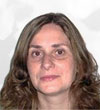 |
|
Interactive Whiteboards, Mobile phones, Internet, digital cameras and... Shakespeare
Can classics like Shakespeare have a relevant place in the postmodern classroom? In this presentation we will explore how Shakespeare’s sonnets can be used as a springboard for highly creative activities which involve the use of technological tools such as IWBs, mobile phones, Internet and digital cameras. We will also analyse how poetry can help our students develop interpretive, reading, speaking, listening and writing skills, as well as fostering their creative potential.
Profesora Susana Dichiera
Susana Dichiera is a graduate English teacher from Instituto de Enseñanza Superior en Lenguas Vivas “Dr Juan Ramón Fernández” , where she also did postgraduate studies in English Literature and where she has been a lecturer in Shakespearean Drama. She currently works at Asociación Argentina de Cultura Inglesa (AACI) where she has taught children, teenage and adult courses for the last ten years and has given several teaching development sessions. She is currently Cambridge ESOL’s Officer at AACI Open Centre.
|
| |
|
| |
|
| |
|
|
|
|
Mesa Redonda: “La Violencia en la Escuela”
Coordinadora: Licenciada Viviana Bárcena
Profesora de Filosofía, Instituto Superior del Profesorado “Dr. Joaquín V. González”
Licenciada en Tecnología Educativa, Universidad Tecnológica Nacional.
Profesora del Área Transdepartamental Docente del Instituto Universitario Nacional de Arte (IUNA), Profesora en la Facultad de Ciencias Económicas de la Universidad de Buenos Aires y en el
Instituto Nacional Superior del Profesorado Técnico de la Universidad Tecnológica Nacional y el Instituto de Enseñanza Superior “Dra. Alicia Moreau de Justo”. Ex becaria de UBACyT y del Instituto de Cooperación Iberoamericana ( España)
Doctor Eduardo Sapia
Abogado - Universidad Nacional de Lomas de Zamora.
Postgrado: Especialista en Derecho de Familia -Universidad Nacional de Lomas de Zamora.
Mediador – Fundación Retoño.
Orientador Familiar – Universidad Austral.
Maestrando en Derecho de Familia, niñez y adolescencia, Universidad de Buenos Aires.
Se desempeña como profesor de curso y profesor tutor de nivel secundario desde hace 21. años.
Profesor de Política y Legislación Educativa, Instituto Nacional Superior del Profesorado Técnico de la Universidad Tecnológica Nacional.
Profesor en la Universidad Nacional de Lomas de Zamora.
Ex -Profesor de Aspectos legales de las Adicciones en Instituro Superior de Ciencias de la Salud y Universidad Nacional de Lanús
Doctora Silvia Germani
Médica - Universidad Nacional de Buenos Aires.
Medica Especialista en Psiquiatría y Terapia Familiar – Ex-Residente de la Provincia de Buenos Aires.
Master en Minoridad y Familia – Universidad Nacional de Lomas de Zamora.
Perito Médico Psiquiatra del Juzgado de Familia de la Provincia de Buenos Aires.
Becaria del Ministerio de Salud de la Provincia de Buenos Aires.
Licenciado Gerardo Bettinotti
Licenciado en Psicologia – Universidad de Buenos Aires.
Ex - Director del Departamento de Psicologia y Ciencias Pedagógicas- Universidad CAECE
Ex Profesor en la Universidad de Buenos Aires, Universidad Palermo y el Posgrado del Centro De Salud Mental Ameghino.
Ex Sub Jefe del Servicio de Psicología del Hospital Churruca-Visca
Licenciado Juan Carlos Udovín
Profesor en Inglés, Instituto Superior del Profesorado "Dr. Joaquín V. González".
Licenciado en Lengua Inglesa, Universidad del Salvador.
Licenciado en Psicología, Universidad Argentina “John F.Kennedy”.
Especialización en Psicología Deportiva. APDA (en curso)
Maestrando en Psicología Organizacional de la Universidad de Belgrano.
Profesor de Inglés en establecimientos varios desde 1981 a la fecha.
Fundador y Director General del Instituto Superior Cultural Británico (Institución de Formación Docente Terciario) Gran Buenos Aires 1988 a la fecha.
Fundador, Representante Legal y Director del Nivel Polimodal del Instituto Naciones Unidas del Mundo Fundador y Culturas Unidas del Mundo. Coordinador General de actividades culturales y educativas de la Sociedad Italiana de San Miguel.
Consultor Educativo y Organizacional. Docente de Psicosociología Laboral en la Universidad Argentina J.F. Kennedy. Disertante en Congresos Educativos en el interior y exterior del país.
|
| |
|
| |
|
| |
|
|
|
|
|
|
|
|
| |
|
|
|
|




